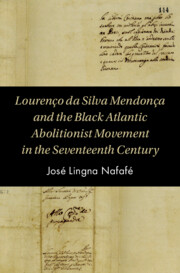
- Publisher:
- Cambridge University Press
- Online publication date:
- August 2022
- Print publication year:
- 2022
- Online ISBN:
- 9781108974196


This groundbreaking study tells the story of the highly organised, international legal court case for the abolition of slavery spearheaded by Prince Lourenço da Silva Mendonça in the seventeenth century. The case, presented before the Vatican, called for the freedom of all enslaved people and other oppressed groups. This included New Christians (Jews converted to Christianity) and Indigenous Americans in the Atlantic World, and Black Christians from confraternities in Angola, Brazil, Portugal and Spain. Abolition debate is generally believed to have been dominated by white Europeans in the eighteenth century. By centring African agency, José Lingna Nafafé offers a new perspective on the abolition movement, showing, for the first time, how the legal debate was begun not by Europeans, but by Africans. In the first book of its kind, Lingna Nafafé underscores the exceptionally complex nature of the African liberation struggle, and demystifies the common knowledge and accepted wisdom surrounding African slavery.
2022 One of BBC History Magazine's Books of the Year
'By following Lourenço da Silva Mendonça in Angola, Brazil, Portugal and Spain and unveiling the criminal court case he presented before the Pope in 1684, José Lingna Nafafé reveals a universal message of freedom that in the 17th century crossed the Atlantic and reached the Vatican, doing justice to the African contribution to the abolitionist movement.'
Giorgio de Marchis - Roma Tre University
'This is a groundbreaking study on the slave trade and its abolition. Nafafé privileges African perspectives on the debates regarding the legality of enslavement, combining a wide range of sources. The result is an engaging book, reconstructing the experiences of a 17th century Kongolese nobleman turned into an abolitionist. This is a crucial study problematizing the history of the slave trade and of the abolitionist movement, stressing the role of Africans as intellectuals debating rights in European courts. A must read.'
Mariana P. Candido - Emory University
'In his extraordinarily well researched and carefully argued book, José Lingna Nafafé reveals the important role of Lourenço da Silva Mendonça in the lead-up to the abolition of slavery. Spending years combing through archives, Nafafé not only uncovered that Africans did indeed support the abolition of the slave trade, but that some were remarkably well placed to make a case for it. This is a substantial contribution to our understanding of African intellectual life and moral reasoning.'
John Thornton - Boston University
'… this book is testament to Nafafé's years of research in the archives in Brazil, Portugal and the Vatican, and to his detailed understanding of the religious, literary and ethnographic contexts of the surviving sources.'
Toby Green Source: London Review of Books
'Nafafé has done us a great service by bringing Mendonça’s story to readers … Nafafé has written not only a great reference but an enjoyable read that illustrates how one man’s life was shaped by Atlantic entanglements and how he dealt with those entanglements.’
Miguel Valerio Source: H-LatAm (https://networks.h-net.org)
 Loading metrics...
Loading metrics...
* Views captured on Cambridge Core between #date#. This data will be updated every 24 hours.
Usage data cannot currently be displayed.